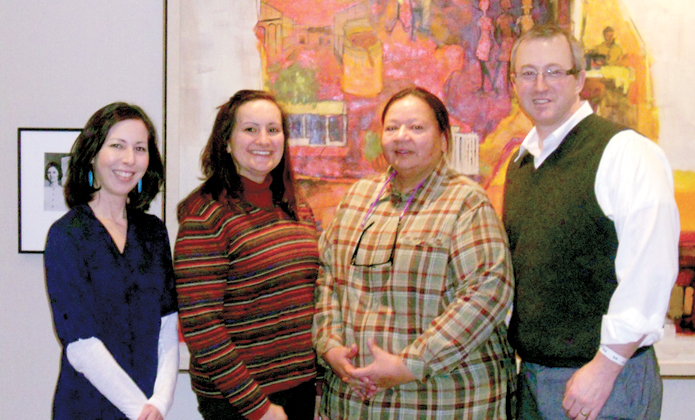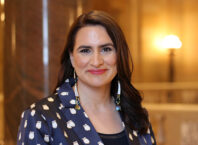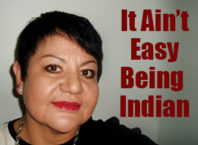 Among Native Americans, cancer is the leading cause of death, according to the Indian Health Service (IHS). Studies show that Native Americans are more likely to suffer certain types of cancers, like lung or colorectal cancer.
Among Native Americans, cancer is the leading cause of death, according to the Indian Health Service (IHS). Studies show that Native Americans are more likely to suffer certain types of cancers, like lung or colorectal cancer.What is more alarming to many inside the health care field is the lack of resources available to Native communities to detect and prevent forms of cancer that Natives are more at-risk of being diagnosed with.
To curb this, The American Indian Cancer Foundation (AMICAF) was established in 2009 by Natives with a diverse set of expertise and experience. The problems of underfunded health programs coupled with barriers to cancer screening led AMICAF to visualize programs that are culturally sensitive and specific to the forms of cancer most dangerous to Natives.
After bidding for a large IHS funded project aimed at better understanding colorectal cancer, and with a grant from the American Cancer Society, AMICAF was able to move from the drawing board to a functioning non-profit.
The focus of the group at the moment is on colorectal cancer. Colorectal cancer is the second most deadly cancer for Natives. It is a form of cancer that sees much higher rates in Natives living in the Northern Plains (72.5 per 100,000) than whites (52.3 per 100,000).
Dr. David Perdue (Chickasaw) is the AMICAF medical director. He splits his time between clinical practice and AMICAF, and is the person responsible for the grant writing that funds the foundation. Kris Rhodes (Fond du Lac Ojibwe), was just hired to head the new organization as the Executive Director.
As the how the non-profit came about, Rhodes said, "Dr. David Perdue, along with Jackie Dionne from Turtle Mountain, organized the board of directors in 2009. They did the groundwork to create this non-profit organization. AMICAF was designed to combat cancer in Native Americans and to educate others about the health disparities that exist for Native American peoples."
Currently located in the IDS tower in downtown Minneapolis, each member of new AMICAF team works to help achieve the goals of the foundation.
Joy Rivera (Haudenosanunee) is the Community Health Worker for AMICAF. She is the essential link between the community and the program, bridging the gap between potential patients and health care services.
"I work with the community, whether one-on-one or in a group setting. I sit at health fairs and pull the people in, educate them on the issue and hopefully get some of our people to get a screening. We want them to make appointments and follow through with screening. Sometimes we have to start from scratch; people don't even want to talk about colonoscopies," said Rivera.
Anne Walaszek (White Earth Ojibwe), as Research Associate, gathers information from tribes and states, and creates surveys to help AMICAF look at the big picture.
Walaszek said, "I work with programs in Montana, Wyoming, North Dakota, South Dakota and Minnesota. A piece of the project is doing assessments of other facilities; through either the IHS or Urban Development programs. What the population needs first is the health care service, then we can look to see about education; what resources are available, and if the facilities and their condition are acceptable. The second piece is actually the colonoscopies, and how many happen in each region."
The procedures for preventing colorectal cancers are surprisingly simple; there are endoscopies and stool tests, though a colonoscopy once every 10 years is considered the "Gold Standard" in preventing colorectal cancer as it allows the removal of precancerous polyps.
"We know that polyps are slow growing and slow to turn into cancer," Rivera continues, "even if you get a polyp a year after your last colonoscopy, you're not in danger until it's time for your next one. They don't develop into full cancer by then; it takes these polyps a lot of time."
Rhodes said there are problems to providing the health care,"To get a colonoscopy when you're living in a rural area, you have to drive to a location that is able to provide the service, and you don't want to be travelling too far the day before the procedure because of medical preparations."
The organization's dream is for mobile endoscopy. A self-contained semi-truck trailer with procedure rooms equipped with all of the equipment needed to perform colonoscopies that would travel from reservation to reservation providing screening exams.
Since Native Americans are more at-risk for colorectal cancer, the staff at AMICAF advise getting your first screening younger. Rivera said, "Due to the high risk of colon cancer at younger ages in Natives we are now recommending screening start at age 45 instead of 50."
Though the team is currently focusing on colorectal cancer, AMICAF is not limiting itself to one form of cancer prevention. "Lung cancer is the number one killer in the Northern Plains", said Rhodes. "That's very bad. In the future we will be focusing on this and other forms of cancer to help bring the mortality rate down. We're focusing on colorectal cancer right now, but we expect to grow and deal with these other disparities in cancer treatment as well."
AMICAF has laid out a roadmap for the next 10 years. One of their new programs (that is currently in the planning process) called The Only For Tradition Smoking Cessation Program would help Native American smokers kick the habit. The AMICAF staff say they believe that by tailoring the program to preserve the sacredness of tobacco, while at the same time helping Natives to quit commercial tobacco use, the program will significantly drop the lung cancer mortality rate.
There will be other programs as well. AMICAF's goals by 2020 involve more culturally sensitive health-care services that reach out and educate Native both young and old. Some of the programs that AMICAF hopes to work on include the expansion of Wisdom Steps to other states, a successful Minnesota program that teaches Native elders to live a heart-healthy lifestyle, and The Spider Illness program, a curriculum that will educate 10,000 Native high school students a year about cancer risk and prevention.
"I think we have tremendous challenges and opportunity ahead of us," says Rhodes. "AMICAF will be working to better understand the disparities that exist around cancer for American Indian communities and come up with solutions to end the disparities. Disparities aren't only in the number of Native people who are getting cancer, but it's also an issue to access to health care, both prevention and treatment."
Rhodes hopes to one day make access to cutting edge health care available to anyone who needs it.
AMICAF is located on the 8th floor of the IDS center, suite 800, 80 south Eighth street. However, AMICAF plans to eventually move closer to Franklin Avenue. "We want to eventually be in the heart of the community. It is important to us," Rivera says.
If you are interested in screenings for colorectal cancer, don't know if you have been screened before, or are just curious, AMICAF encourages you to give them a call. Also, there are free screenings available for Native Americans unable to afford a colonoscopy through the Minnesota Department of Health SAGE Scopes program. To find out more call Joy Rivera at 612-202-0588, or: jrivera@americanindiancancer.org.
Dr. David Perdue (Chickasaw) is the AMICAF medical director. He splits his time between clinical practice and AMICAF, and is the person responsible for the grant writing that funds the foundation. Kris Rhodes (Fond du Lac Ojibwe), was just hired to head the new organization as the Executive Director.
As the how the non-profit came about, Rhodes said, "Dr. David Perdue, along with Jackie Dionne from Turtle Mountain, organized the board of directors in 2009. They did the groundwork to create this non-profit organization. AMICAF was designed to combat cancer in Native Americans and to educate others about the health disparities that exist for Native American peoples."
Currently located in the IDS tower in downtown Minneapolis, each member of new AMICAF team works to help achieve the goals of the foundation.
Joy Rivera (Haudenosanunee) is the Community Health Worker for AMICAF. She is the essential link between the community and the program, bridging the gap between potential patients and health care services.
"I work with the community, whether one-on-one or in a group setting. I sit at health fairs and pull the people in, educate them on the issue and hopefully get some of our people to get a screening. We want them to make appointments and follow through with screening. Sometimes we have to start from scratch; people don't even want to talk about colonoscopies," said Rivera.
Anne Walaszek (White Earth Ojibwe), as Research Associate, gathers information from tribes and states, and creates surveys to help AMICAF look at the big picture.
Walaszek said, "I work with programs in Montana, Wyoming, North Dakota, South Dakota and Minnesota. A piece of the project is doing assessments of other facilities; through either the IHS or Urban Development programs. What the population needs first is the health care service, then we can look to see about education; what resources are available, and if the facilities and their condition are acceptable. The second piece is actually the colonoscopies, and how many happen in each region."
The procedures for preventing colorectal cancers are surprisingly simple; there are endoscopies and stool tests, though a colonoscopy once every 10 years is considered the "Gold Standard" in preventing colorectal cancer as it allows the removal of precancerous polyps.
"We know that polyps are slow growing and slow to turn into cancer," Rivera continues, "even if you get a polyp a year after your last colonoscopy, you're not in danger until it's time for your next one. They don't develop into full cancer by then; it takes these polyps a lot of time."
Rhodes said there are problems to providing the health care,"To get a colonoscopy when you're living in a rural area, you have to drive to a location that is able to provide the service, and you don't want to be travelling too far the day before the procedure because of medical preparations."
The organization's dream is for mobile endoscopy. A self-contained semi-truck trailer with procedure rooms equipped with all of the equipment needed to perform colonoscopies that would travel from reservation to reservation providing screening exams.
Since Native Americans are more at-risk for colorectal cancer, the staff at AMICAF advise getting your first screening younger. Rivera said, "Due to the high risk of colon cancer at younger ages in Natives we are now recommending screening start at age 45 instead of 50."
Though the team is currently focusing on colorectal cancer, AMICAF is not limiting itself to one form of cancer prevention. "Lung cancer is the number one killer in the Northern Plains", said Rhodes. "That's very bad. In the future we will be focusing on this and other forms of cancer to help bring the mortality rate down. We're focusing on colorectal cancer right now, but we expect to grow and deal with these other disparities in cancer treatment as well."
AMICAF has laid out a roadmap for the next 10 years. One of their new programs (that is currently in the planning process) called The Only For Tradition Smoking Cessation Program would help Native American smokers kick the habit. The AMICAF staff say they believe that by tailoring the program to preserve the sacredness of tobacco, while at the same time helping Natives to quit commercial tobacco use, the program will significantly drop the lung cancer mortality rate.
There will be other programs as well. AMICAF's goals by 2020 involve more culturally sensitive health-care services that reach out and educate Native both young and old. Some of the programs that AMICAF hopes to work on include the expansion of Wisdom Steps to other states, a successful Minnesota program that teaches Native elders to live a heart-healthy lifestyle, and The Spider Illness program, a curriculum that will educate 10,000 Native high school students a year about cancer risk and prevention.
"I think we have tremendous challenges and opportunity ahead of us," says Rhodes. "AMICAF will be working to better understand the disparities that exist around cancer for American Indian communities and come up with solutions to end the disparities. Disparities aren't only in the number of Native people who are getting cancer, but it's also an issue to access to health care, both prevention and treatment."
Rhodes hopes to one day make access to cutting edge health care available to anyone who needs it.
AMICAF is located on the 8th floor of the IDS center, suite 800, 80 south Eighth street. However, AMICAF plans to eventually move closer to Franklin Avenue. "We want to eventually be in the heart of the community. It is important to us," Rivera says.
If you are interested in screenings for colorectal cancer, don't know if you have been screened before, or are just curious, AMICAF encourages you to give them a call. Also, there are free screenings available for Native Americans unable to afford a colonoscopy through the Minnesota Department of Health SAGE Scopes program. To find out more call Joy Rivera at 612-202-0588, or: jrivera@americanindiancancer.org.





